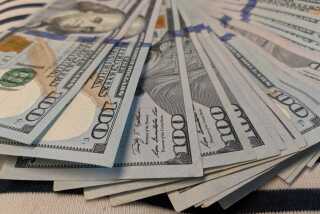Thinking on Weak Dollar Is a Bit Off
- Share via
I must take issue with James Flanigan’s assertions of benefits accrued from a weakening dollar (“Weakening Dollar Will Help Economy More Than Any Bush Stimulus Plan,” Jan. 8).
Assuming the basic assumption was correct, should that not have translated into a soaring economy in Japan in the last decade? In fact, while exports in Japan are at historic highs, its economy continues to falter because of weak domestic consumption partly due to high living costs and inflationary pressure created by its weaker currency.
First, profits based on currency valuation rather than sales generated by operating efficiencies and beneficial trade accords that lower or drop tariffs don’t translate into job creation. Further, such profit is an illusion; it adds to the bottom line without increasing sales.
Second, increased sales as a result of a weakening dollar don’t translate into job creation until sales outstrip current production capacity. Assuming Mr. Flanigan’s theory is correct, most such export firms would have been running at well below capacity and with the exception of labor intensive industries, most are not likely to increase employment until that production level is reached.
Third, jobs created on such a basis only return us to the boom or bust cycles we experienced before 1992. It’s only logical to assume that jobs created when the dollar declines will evaporate when the dollar strengthens. That’s another reason jobs created as a result of production and overall operating efficiencies as well as beneficial trade agreements produce a far more secure job environment.
Michael Solomon
Los Angeles
More to Read
Inside the business of entertainment
The Wide Shot brings you news, analysis and insights on everything from streaming wars to production — and what it all means for the future.
You may occasionally receive promotional content from the Los Angeles Times.









